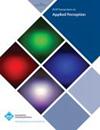在动态驾驶模拟器中使用头戴式显示器对驾驶行为的影响
IF 1.9
4区 计算机科学
Q3 COMPUTER SCIENCE, SOFTWARE ENGINEERING
引用次数: 3
摘要
驾驶模拟器是汽车开发和研究中常用的工具。大多数模拟器使用监视器或投影仪作为其主要显示系统。然而,新一代头戴式显示器的出现引发了人们将其作为主要显示类型的兴趣。头戴式显示器的总体优点和缺点已经得到了很好的研究,但它们对模拟器中驾驶行为的影响还没有得到充分的量化。本文在一个大型动态驾驶模拟器中研究了基于投影仪的图形与头戴式显示器的驾驶行为差异。本研究选择了五种特定的驾驶动作,这些动作可能会根据显示技术的选择对驾驶行为产生不同的影响。选择其中一些机动来揭示横向和纵向驾驶行为的变化。其他的被选中是因为他们能够突出头戴式显示器在驾驶环境中的优点和缺点。结果显示,当比较投影仪和头戴式显示器时,驾驶员的横向和纵向行为变化很小。当显示器分辨率对驾驶任务至关重要时,可以看到投影仪最明显的差异。显示类型的选择不影响模拟器病,也不影响被试评定的真实感。本文章由计算机程序翻译,如有差异,请以英文原文为准。
The Effects on Driving Behavior When Using a Head-mounted Display in a Dynamic Driving Simulator
Driving simulators are established tools used during automotive development and research. Most simulators use either monitors or projectors as their primary display system. However, the emergence of a new generation of head-mounted displays has triggered interest in using these as the primary display type. The general benefits and drawbacks of head-mounted displays are well researched, but their effect on driving behavior in a simulator has not been sufficiently quantified.
This article presents a study of driving behavior differences between projector-based graphics and head-mounted display in a large dynamic driving simulator. This study has selected five specific driving maneuvers suspected of affecting driving behavior differently depending on the choice of display technology. Some of these maneuvers were chosen to reveal changes in lateral and longitudinal driving behavior. Others were picked for their ability to highlight the benefits and drawbacks of head-mounted displays in a driving context.
The results show minor changes in lateral and longitudinal driver behavior changes when comparing projectors and a head-mounted display. The most noticeable difference in favor of projectors was seen when the display resolution is critical to the driving task. The choice of display type did not affect simulator sickness nor the realism rated by the subjects.
求助全文
通过发布文献求助,成功后即可免费获取论文全文。
去求助
来源期刊

ACM Transactions on Applied Perception
工程技术-计算机:软件工程
CiteScore
3.70
自引率
0.00%
发文量
22
审稿时长
12 months
期刊介绍:
ACM Transactions on Applied Perception (TAP) aims to strengthen the synergy between computer science and psychology/perception by publishing top quality papers that help to unify research in these fields.
The journal publishes inter-disciplinary research of significant and lasting value in any topic area that spans both Computer Science and Perceptual Psychology. All papers must incorporate both perceptual and computer science components.
 求助内容:
求助内容: 应助结果提醒方式:
应助结果提醒方式:


